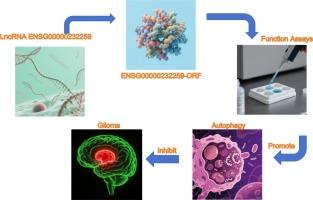肽eng00000232259 - orf通过促进自噬抑制胶质瘤细胞的增殖和迁移。
IF 2.6
4区 医学
Q3 NEUROSCIENCES
引用次数: 0
摘要
胶质瘤是一种恶性脑肿瘤,其中lncRNA eng00000232259显著上调。生物信息学预测表明,它可能编码多肽ENSG00000232259-ORF,但该多肽在胶质瘤中的生物学功能和机制尚不清楚。采用GEPIA数据库进行基因表达及相关性分析,结合GetORF预测多肽编码潜能,并采用Western blot验证ENSG00000232259-ORF的表达。功能实验表明,CCK8、集落形成、Transwell和scratch实验证明,该多肽能显著抑制胶质瘤细胞的增殖和迁移,且这种作用不依赖于其亲本lncRNA。机制上,eng00000232259 - orf通过上调ATG3表达促进自噬,表现为LC3B水平升高,P62水平降低。ATG3的敲低逆转了多肽对细胞增殖和迁移的抑制作用。这些发现表明,eng00000232259 - orf通过激活自噬途径抑制胶质瘤的进展,为肿瘤治疗提供了潜在的新靶点。本文章由计算机程序翻译,如有差异,请以英文原文为准。

The peptide ENSG00000232259-ORF inhibits glioma cell proliferation and migration by promoting autophagy
Glioma is a malignant brain tumor in which the lncRNA ENSG00000232259 is significantly upregulated. Bioinformatics predictions suggest that it may encode the polypeptide ENSG00000232259-ORF, but the biological function and mechanisms of this polypeptide in glioma remain unclear. Gene expression and correlation analyses were conducted using the GEPIA database, combined with GetORF to predict the polypeptide-coding potential, and Western blot was employed to validate the expression of ENSG00000232259-ORF. Functional experiments demonstrated that this polypeptide significantly inhibits glioma cell proliferation and migration, as evidenced by CCK8, colony formation, Transwell, and scratch assays, and this effect is independent of its parent lncRNA. Mechanistically, ENSG00000232259-ORF promotes autophagy by upregulating ATG3 expression, manifested by increased levels of LC3B and decreased P62. Knockdown of ATG3 reversed the inhibitory effects of the polypeptide on cell proliferation and migration. These findings reveal that ENSG00000232259-ORF suppresses glioma progression by activating the autophagy pathway, providing a potential new target for tumor therapy.
求助全文
通过发布文献求助,成功后即可免费获取论文全文。
去求助
来源期刊

Brain Research
医学-神经科学
CiteScore
5.90
自引率
3.40%
发文量
268
审稿时长
47 days
期刊介绍:
An international multidisciplinary journal devoted to fundamental research in the brain sciences.
Brain Research publishes papers reporting interdisciplinary investigations of nervous system structure and function that are of general interest to the international community of neuroscientists. As is evident from the journals name, its scope is broad, ranging from cellular and molecular studies through systems neuroscience, cognition and disease. Invited reviews are also published; suggestions for and inquiries about potential reviews are welcomed.
With the appearance of the final issue of the 2011 subscription, Vol. 67/1-2 (24 June 2011), Brain Research Reviews has ceased publication as a distinct journal separate from Brain Research. Review articles accepted for Brain Research are now published in that journal.
 求助内容:
求助内容: 应助结果提醒方式:
应助结果提醒方式:


